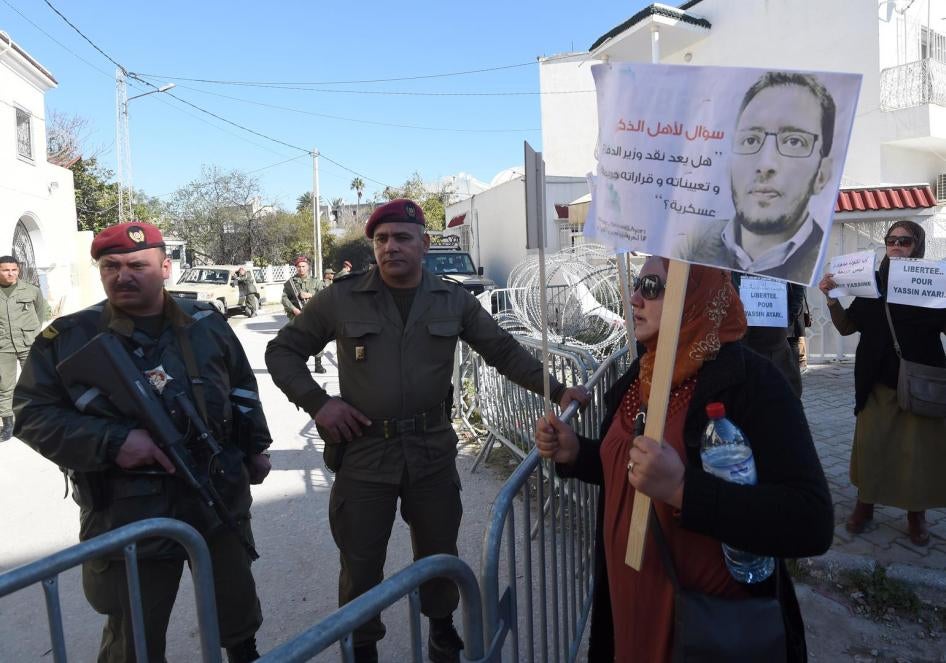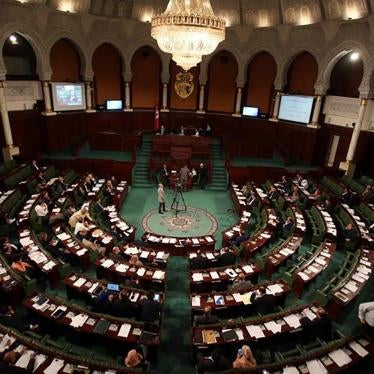(Tunis) – A military court sentenced a member of Tunisia’s parliament to three months in prison on June 26, 2018, for a Facebook post criticizing the army, Human Rights Watch said. Yassine Ayari, the parliament member, has faced numerous military prosecutions for his Facebook posts mocking military top brass.
The military prosecutor charged Ayari with “high treason,” a capital offense under article 60 of the penal code, for a Facebook post published on April 28, 2017. He also charged Ayari with “defaming the army” under article 91 of the Code of Military Justice and “offending the President of the Republic” under article 67 of the penal code. The court convicted Ayari only on the charge of defaming the army.
“The relentless prosecution of a peaceful critic of the army and the president – and by a military court, no less – is the mirror opposite of what should be happening in a democratic transition,” said Amna Guellali, Tunisia director at Human Rights Watch.
Ayari, running as an independent, won a seat in parliament in December 2017, to represent Tunisians living in Germany. He was sworn in on February 7, 2018, and has participated actively in parliamentary work in Tunisia.
He was also sentenced on March 27 to 16 days in prison for another blog post. He did not serve his sentence. In 2015, Ayari spent more than four months in prison after a military court sentenced him for defaming the military high command on his Facebook account. Tunisia should stop trying civilians in military courts, Human Rights Watch said.
Human Rights Watch reviewed the court files of the most recent case. On April 28, 2017, the military prosecutor opened an investigation into whether Ayari had “published a Facebook post containing expressions likely to undermine the dignity of the military institution by criticizing the decisions of its high commanders, in addition to defaming the President of the Republic, the commander of the military forces.” The case file includes a screen shot of a Facebook post attributed to Ayari.
The post alleges that President Beji Caid Essebsi has tried to use the military to repress the population. The post refers to other “failed attempts” by former presidents Habib Bourguiba and Zine el-Abidine Ben Ali to quell protests by resorting to the army and commends rank-and-file soldiers and some military commanders who refused to obey orders to use force against protesters. The post calls the president a “clown,” among other epithets.
In a June 26, 2018 Facebook post, Ayari, who is currently in Germany, announced that he will not appeal the sentence because he does not want to give the military court another chance to pursue this “travesty of justice.” Ayari has immunity from arrest unless the parliament, the National Constituent Assembly, votes to lift it or he voluntarily renounces it. In a Facebook post, he declared that he has renounced his parliamentary immunity, “to have a clean slate,” and that he is ready to serve his sentence.
Since the ouster of Ben Ali in January 2011, military prosecutors have used article 91 of the military code to try civilians. That article punishes with up to three years in prison anyone who “commits ... outrages against the flag or the army, offenses against the dignity, reputation or morale of the army, or acts to undermine military discipline, obedience and the respect due to superiors, or who criticizes the action of military hierarchy or the military officers, offending their dignity.”
Prosecutions for defaming the army or other state institutions are incompatible with Tunisia’s obligations under article 19 of the International Covenant on Civil and Political Rights (ICCPR). In 2011, the United Nations Human Rights Committee, which monitors implementation of the covenant, issued guidance to states parties on their free speech obligations under article 19 that emphasized the high value that the ICCPR places upon uninhibited expression “in circumstances of public debate concerning public figures in the political domain and public institutions,” adding that, “State parties should not prohibit criticism of institutions, such as the army or the administration.”
Allowing the prosecution of a civilian before a military tribunal is a violation of the right to a fair trial and due process guarantees, Human Rights Watch said. The Resolution on the Right to a Fair Trial and Legal Aid in Africa noted that “[t]he purpose of Military Courts is to determining offenses of a pure military nature committed by pure military personnel.”









